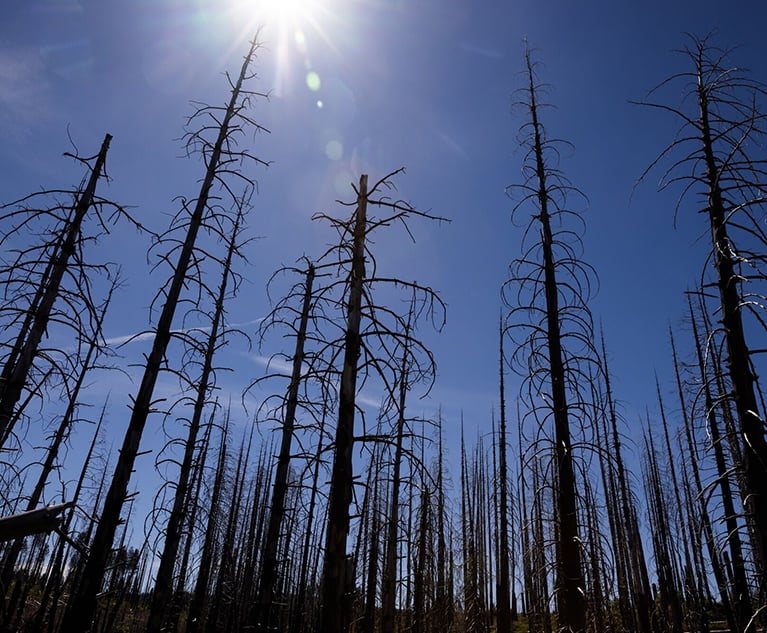The science of climate change might remain controversial amongskeptics, but within the insurance industry there is a growingconsensus that the risks are real, and that carriers must deal withthe growing exposures as well as seize the opportunities theproblem presents.
|In a report released by Ernst and Young--"Strategic BusinessRisk: Insurance 2008"--the consulting firm reviewed the top-10strategic risks insurers face, placing climate change atop the listand calling it "a long-term issue with broad-reaching implicationsthat will significantly impact the industry."
|Changes in weather patterns caused by climate change "will bringabout a fundamental shift in the underlying probability of insuredloss (by windstorm or flood) and require insurers to scrutinizetheir insurability criteria for certain risks," the reportconcluded.
|Climate change will also affect carrier pricing and reservingpolicies, as well as raise solvency and corporate viability issues,the report pointed out.
|Windstorms, flooding and heat waves produced by global warmingcan lead to "broader and more gradual consequences" the reportwarned--increasing mortality and health problems, spreadingenvironmental litigation, raising political risk linked toconflicts for control of resources, and also affecting the capitalmarkets.
|"These implications could result in correlations acrossgeographies and insurance classes--perhaps sooner than expected,"according to the report.
|"One of the main ways in which human populations currently copewith the risks of extreme weather-related hazards...is throughinsurance," according to a report released by modeler RiskManagement Solutions--"The Role of Insurers in Promoting Adaptationto the Impacts of Climate Change."
|Pointing out the scientific evidence that climate change exists,it cites actions insurers are taking to deal with the growingreality and the challenges they face. The report also notes some ofthe differences between the United Kingdom and Europe versus theUnited States in dealing with the exposure issues climate changepresents.
|Bob Ward, director of global sciences network for RMS and one ofthe authors of the report, said his purpose was to convey themessage to insurers that now is an opportunity to assume aleadership role in identifying the exposure, working to controlthose risks, and taking a front seat in the general debate overclimate change and its potential impact on people and property.
|He noted that from a political stand-point, it is easier to talkabout the issue in the United Kingdom than in the United States,where global warming remains a hotbed of controversy.
|He also observed that in general, U.S. insurers have been slowerto come to grips with the exposure issues stemming from climatechange than have those in the United Kingdom and Europe.
|He said the challenges from climate change will not remain thesame over time, and as those shifts occur, there needs to be moreattention paid to the evolving risk.
|One way insurers can go about promoting adaptation to climatechange and the associated exposures, he suggested, would be tocharge premiums that truly reflect the risk, creating an incentivefor policyholders to mitigate their potential losses.
|"Global climate change is the biggest challenge facing theworld, and it is going to require the public and private sectors,and the public as well, to help [meet it]," he said. "If we do notadapt, the risk will go up, and that has potential consequences forthe insurance system."
|One positive difference is that more and more insurers arestarting to confront the potential exposures of climate change,according to Fred Perez, vice president for McLarens YoungInternational, a claims adjusting firm based in Los Angeles.
|"We are talking more about this issue than we were five yearsago, and [the dialogue] is growing," he said.
|From a claims perspective, the issue is not limited to propertydamage but extends to professional liability and general liabilityas well--affecting engineers, consultants, architects and otherswho can be accused of not considering the potential impact ofclimate change in their work.
|Suits can and are being filed affecting general liabilityexposures over the production of greenhouse gases by corporations,he noted. Meanwhile, states are suing utilities over toxicemissions crossing state lines, causing property damage from acidrain, he added.
|Directors and officers of companies also face litigation fromshareholders suits, where some weather or natural event that couldbe related to climate change occurs that negatively affects thefirm's stock price.
|The accusation, he noted, is that executives did not warn, orfailed to perform their duty to be aware of the effects of climatechange on the business.
|As claims professionals, Mr. Perez said, "we have to become moreeducated on global warming and its effect." He compared this toyears ago, when pollution exposures began to grow, and claimsadjusters had to become expert in the effects this had on soil, airand waterways.
|"Now we must become experts on climate change for the samereason," he said.
|While some are urging insurers to become more aware and involvedin the debate and response efforts regarding climate change,carriers are already more involved than many realize, according toWilliam F. Stewart, an attorney for Cozen O'Connor who co-chairsthe firm's climate change practice area.
|He said the industry "takes such a beating sometimes," and has abad reputation on many fronts--but on climate change the reality ismany underwriters are at the forefront of the issue with productsand education efforts.
|"As a whole, the insurance industry has responded and is aheadon this issue, and has been a leader in the debate on climatechange," he said.
|In a report titled "The Business of Global Warming: Managing theRisks and Opportunities of Climate Change," Mr. Stewart and PeterJ. Fontaine discussed the issues and legal challenges corporationsface regarding climate change.
|In their 62-page report, they noted that because of theinsurance industry's financial clout, as well as its ability toidentify, evaluate and manage risk, insurers have a unique role inadvancing risk mitigation and adaptation efforts--such as improvedbuilding standards, or changing land-use rules to move constructionaway from vulnerable coastal areas.
|The report found that insurers have produced hundreds ofproducts and services to deal with global warming issues, and thata number of carriers--most prominently AIG, Allianz, AXA, RoyalSunAlliance, Munich Re and Swiss Re--have been playing major rolesin promoting discussions and thinking on the issue.
|In the claims arena, the report identified professionalliability and D&O as two major areas of potential litigation.While there are no exclusions today, disputes could begin to ariseas insurers develop and implement endorsements in response to agrowing tide of climate change litigation.
|At some point, the United States will likely pass legislationimposing greenhouse gas emission restrictions--no doubt by the endof the decade, the report predicted. This could mean theestablishment of either carbon taxes or cap-and-trade systems, toencourage and reward risk mitigation.
|Either system, the report said, could generate litigation overD&O or professional liability should certain companies fail tolive up to their legal obligations, prompting lawsuits againstthose outside experts hired to help firms comply with the law.
|"This is an extremely thorny and complex problem," said Mr.Stewart. "It is hard to get your hands around it. The idea [of ourreport] is to give the problem some context and help readers have asense of context for the problems."
Want to continue reading?
Become a Free PropertyCasualty360 Digital Reader
Your access to unlimited PropertyCasualty360 content isn’t changing.
Once you are an ALM digital member, you’ll receive:
- All PropertyCasualty360.com news coverage, best practices, and in-depth analysis.
- Educational webcasts, resources from industry leaders, and informative newsletters.
- Other award-winning websites including BenefitsPRO.com and ThinkAdvisor.com.
Already have an account? Sign In
© 2024 ALM Global, LLC, All Rights Reserved. Request academic re-use from www.copyright.com. All other uses, submit a request to [email protected]. For more information visit Asset & Logo Licensing.








